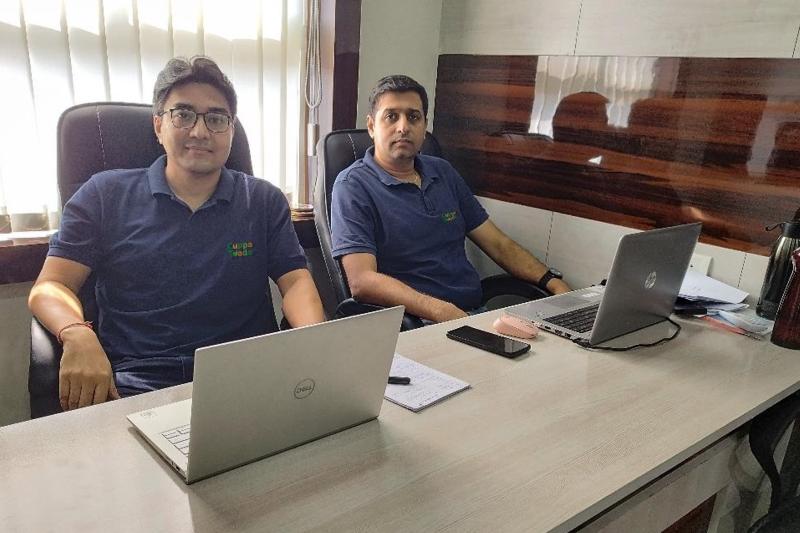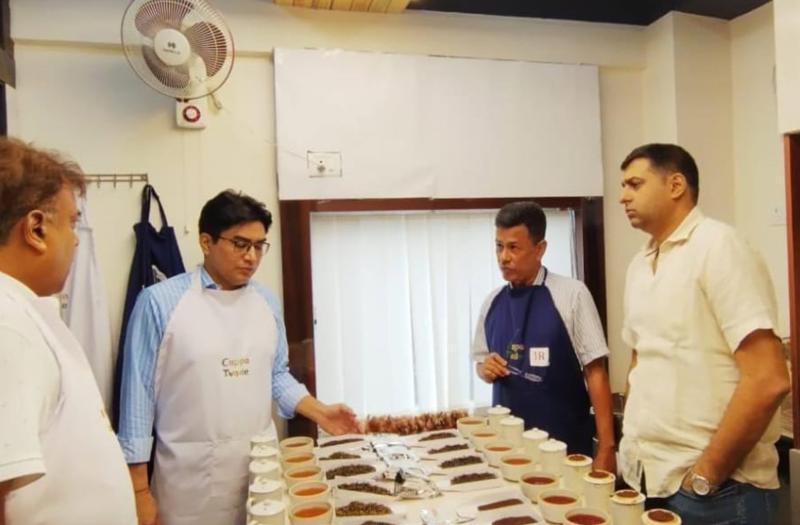They were living the post-liberalization Indian dream – two MBAs, namely Sandip Thapa and Mihir Gandhi. They’d been making "bank" for two decades in the private business sector, the last five of which were for an electronic auction service provider called mjunction, but the pair decided to join forces after the COVID-19 lockdown to launch Cuppa Trade.
Cuppa Trade is a new electronic tea auction marketplace that seeks to revolutionize how tea is wholesaled in India.
While Thapa had come from the tea industry and Gandhi from business solutions, they made a good team, rolling out an e-tea auction platform for wholesalers in Jorhat, India, on behalf of the Indian government (an mjunction client at the time). This became a primer to focus their attention on tea sales.
During the project, they realized that over the years, buyers and sellers were moving away from an auction system, which was cumbersome, had high barriers to entry, and involved brokers who controlled much of the activity, siphoning a significant share of the profits. Also, the tea had to be warehoused at the auction site, sometimes languishing for five to seven weeks before delivery.
“While technology has grown leaps and bounds, the tea industry is still rooted in archaic conventions and modes of disposal,” said Thapa.

Indeed, the current auction system in India, which encompasses storage and delivery, was developed by the British and originally ran in London before moving to Calcutta and regional centers in India. The process requires registered bidders to engage solely through brokers in their bidding process, who also taste the tea and arrive at a nominal price for the product. In the end, it leaves a lot of judgment and control under the purview of players who are nether sellers nor buyers. Also, the minimum amount of tea that can be offered for auction is five bags, which at approximately 25 kg per bags translates to 100 kg of tea. For many small tea growers, this is two large a lot to offer for auction.
According to Thapa and Gandhi, the variety of tea that India produces does not get adequately exposed in the market, as a result. Sellers, especially proprietary and small tea producers, typically do not have the means, information or time to either explore or expand newer markets – domestic or international.
Consequently, private sales have been outstripping auction participation by a proportion of two to one. Of course, tea being one of India's main commodities both domestically and for the export market, the entrepreneurial pair saw this as an exciting opportunity.
“Our focus is clearly on the small tea growers, co-operatives and small tea producers who do not have the means or knowledge to reach out to markets at large and are exploited by a handful of traders, packeteers and exporters,” said Thapa.
RELATED: New Commodity Marketplace Supports the Tea Industry, Gains Traction in Sri Lanka
On a Tea Auction Journey
Giving up comfortable and secure jobs for the risk of starting a business is a difficult decision to make for anyone. But circumstances in 2020 gave Thapa and Gandhi the time to reflect on their respective situations.
During the COVID-19 pandemic, Gandhi had been rethinking his life. Being forced to stay home had spurred introspection and reflection. He had a job that many would consider to be “cushy,” but, at the same time, he was not in control of his destiny. Also, reading about the individuals who had started businesses during the COVID-19 lockdown and its immediate wake, provided inspiration for this young businessman.
Even before mjunction, Gandhi had been working in the business-to-business arena in steel. “From managing sales in Western india to heading all India operations for the company’s largest business verticals, I gained experience at a steel major, followed by two decades in the leading e-auction platform,” he said. “I always wanted to be an entrepreneur. The COVID-19 pandemic gave me ample time to ponder over it.”
Thapa had been involved in an initiative under the Tea Board India, which included setting up a unique platform, based on auction and e-marketplace models. It was an exhaustive initiative taking three years to complete. During the lockdown, Thapa reflected on that experience, and he became convinced that he had the seeds to change the way tea is sold in India.
“My extensive travels across the country, both at tea-growing as well as tea-consuming destinations, and thousands of hours of interaction with variety of stakeholders, gave me in-depth understanding of what’s ailing the industry and what could be the possible solutions,” Thapa explained. “Moreover, I was keen to bring the latest tech and learnings from successful e-marketplace models like Alibaba, Amazon.com, Airbnb, etc. into tea, which hitherto no one had done.”
By the time Thapa and Gandhi had reunited at work, they were of the same mind. Gandhi said: “During COVID, I got a lot of time to think on what and how I could utilize my domain expertise and learnings gathered over the years to build something exciting, impacting people’s lives in a meaningful way. Sandip and I had worked together in mjunction. To start an agri-commodity e-marketplace made sense to us. And because the tea industry is crying for innovation and there’s no B2B startup in that space, we focussed on tea as our first commodity.”
As a result of all their deep thought on the topic, Thapa and Gandhi quit their jobs and decided to create an e-marketplace that allowed sellers and buyers to trade whatever amounts of tea they wanted, directly, without any brokers, and at a price negotiated directly by them. There would be a “buy it now” price offered by the sellers and buyers could make offers just as they could with auction sales. The idea looked a lot like the eBay or the Amazon.com of tea. They called themselves Cuppa Trade.
Cuppa Trade Sees Success
A year into development and three months after going live, 900 buyers and 150 sellers have already registered on their site to conduct tea business.
The secret to their success is efficiency. By cutting out the brokers and reducing transportation and warehousing costs – as well as delivery times – they have managed to dramatically decrease the costs of selling for tea producers. Profits to sellers have increased by about 20 percent, with just-in-time delivery from gardens taking 80 percent less time to ship. Customers seem to be happy. And at their current rate of expansion, their e-auction threatens to disrupt the Indian auction system.
While Cuppa Trade registration is free for buyers, sellers are charged a small percentage fee of the total transactional value.
Sorting Out Auction Issues
Stalwarts in the tea industry are skeptical about the new Cuppa Trade e-marketplace venture. For example, the Owner of Goomtee Tea Estate and Chairman of the Indian Tea Exporter’s Association, Anshuman Kanoria, said: “I don’t think it will last… What will they do about tasting? I taste every lot of my tea, and I can tell you that each lot tastes different, not to mention elevation and other factors affecting flavor. Are they depending on blind buyers?”
To address the flavor gap, the Cuppa Trade team has developed a scorecard in which their head taster, Irshad Rehman, tastes the tea and arrives at an overall score based on a common set of criteria, such as appearance, body, brightness, color, texture, body and briskness and taste/flavor/aroma, among other more unique characteristics. Their scorecard considers a pure black brew and also a brew with milk added. The scorecard is hardly an extensive tasting of every lot at every elevation as Kanoria said he does, but it offers an objective and systematic means of evaluating flavor for potential buyers.
“Buyers have taken well to the scorecard as the set of criteria are objective and common to all teas,” said Thapa. “And for those who wish to taste the teas themselves before completion of the transaction, [Cuppa Trade] sends them samples.”
While unlike auctions in which teas are stored in a secure warehouse before they are sold, the buyer buys directly from the seller. Traceability is a huge issue in international markets, where mostly blended tea is sold and the buyer having limited or no knowledge of whether teas are ethically sourced following the correct norm. What ensures that buyers are getting what they’ve purchased is the involvement of Cuppa Trade, to ensure that the lot purchased is that which goes to the buyer. Cuppa Trade is physically present when the tea is loaded for transport.
“Ultimately, we want to establish a QR-coding system, which can electronically trace back the tea to a specific lot and plucking date,” said Thapa.
All of the Cuppa Trade tea transactions take place online, facilitated by HDFC Bank Ltd In India, which handles transactions and deals with credit issues for both buyers and sellers.
For U.S. and U.K. customers, buyers can buy in their own currency. This hedges any foreign currency risk of fluctuations in the value of the dollar or pound vs. the rupee.

A Growing Venture
Thus far, having made an admirable accomplishment in tea, Cuppa Trade has their sights on other products like spices and coffee – and they plan to go global. They already have an office in Nepal, headed by International Business Head and Nepal Head, Satrajit Banerjee, formerly of the Tea Board India, and customers in the United States and the U.K. and are already looking at the map with eyes on the Eastern horizon. Arrangements made with banks in those countries have made transacting more expedient, as buyers can purchase in their own currency, and the company faces no foreign currency risk.
Already, large tea producers like OKAYTI tea estate in Darjeeling, which sells both privately and within the traditional tea auction setup, have registered with Cuppa Trade. The founders believe this demonstrates that long-standing players in tea are willing to gamble on the platform, and that it's an encouraging first step as the business moves forward on its innovative and disruptive journey.
To learn more about Cuppa Trade, visit CuppaTrade.com.
Editor's Note: This article was updated on Oct. 13, 2023, for clarification purposes.
SB Veda is the pen name for Sujoy Bhattacharyya, who is a British/Canadian writer based in Kolkata. Born in London and raised in the U.K. and Canada, the award-winning writer and editor’s work has also been published in The Independent, The Guardian, the Ottawa Citizen, The Global Calcuttan and Pragati International. He has a longstanding connection to Darjeeling, where he tries to visit once a year, and he’s currently working on a book about a Darjeeling tea garden, which will be released soon.
Don’t Miss the Weekly World Tea News eNewsletter! Get your free subscription, if you’re not already subscribed, by clicking here.
Plan to Attend or Participate in World Tea Expo, March 18-20, 2024
To learn about other key developments, trends, issues, hot topics and products within the global tea community, plan to attend World Tea Expo, March 18-20, 2024 in Las Vegas, co-located with Bar & Restaurant Expo. Visit WorldTeaExpo.com.
To book your sponsorship or exhibit space at the World Tea Conference + Expo, or to enquire about advertising and sponsorship opportunities at World Tea News, contact:
Ellainy Karaboitis-Christopoulos
Business Development Manager, Questex
Phone: +1-212-895-8493
Email: [email protected]
Also, be sure to stay connected with World Tea Expo on social media for details and insights about the event. Follow us on Twitter, Facebook, Instagram and LinkedIn.
